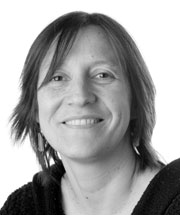Alejandra Loyola, PhD
Biography
Dr. Loyola performed her primary and high school studies at Colegio del Sagrado Corazón. Monjas Inglesas in Santiago, Chile. Then, in 1988, she entered to Facultad de Ciencias Químicas y Farmacéuticas, Universidad de Chile to study Biochemistry. Her thesis work was carried out in the lab of María Rosa Bono and Mario Rosemblatt at Facultad de Ciencias, Universidad de Chile, where she analyzed the induction mechanism of the cell adhesion molecule ICAM-1 mediated by IFN-γ.
Then, in 1997, Dr Loyola entered to the joined PhD program of Rutgers University and University of Medicine and Dentistry of New Jersey, in New Jersey, USA. Her thesis work, performed in the lab of Dr Danny Reinberg, was focused on the characterization of RSF, a chromatin assembly factor identified in the Reinberg’s lab. She graduated in 2003.
In 2003, Dr Loyola moved to the Institut Curie, in Paris, France, and worked at the lab of Dr. Geneviève Almouzni for her post-doctoral training. She investigated post-translational modifications occurring on histone H3 variants. During those years of training, she was awarded with an Institut Curie fellowship and then with an EMBO fellowship.
In 2006 Dr Loyola started her second post-doctoral training at the MD Anderson Cancer Center in Houston, Texas, USA, in the lab of Dr Sharon Dent. Her work focused on the enzymes involved in histone post-translational modifications. She was awarded with an Odyssey fellowship.
In 2008 she went back to Santiago, Chile, to establish her own lab at Fundación Ciencia & Vida, where she is Head of the Epigenetics and Chromatin Lab. Since then, Dr. Loyola has been focusing on several aspects related to epigenetics and chromatin. Her research has been funded by several extramural grants, including FONDECYT and collaborative grants. Dr. Loyola has directed thesis work at different levels: 11 undergraduate theses, 6 master degree theses, and 9 Ph.D. theses. Her lab has received a total of five post-doc trainees.

